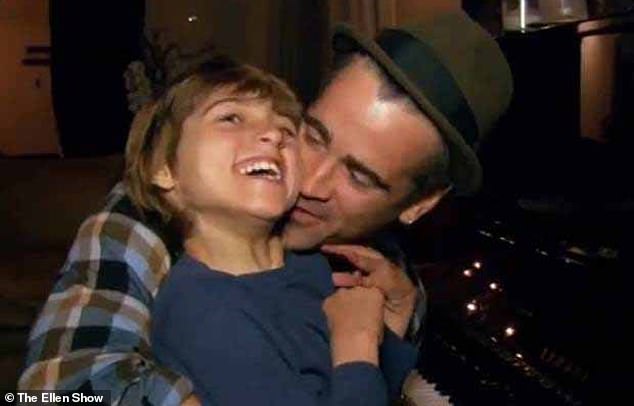My Daughter Has Angelman Syndrome, Just Like Colin Farrell’s Son: What It’s Like Living With the Condition
A mother tells what it’s like for her daughter to live with a rare developmental disorder, just like the son of actor Colin Farrell.
A TikTok user named Ashluv shares videos chronicling the daily lives of her and her teenage daughter Makayla.
Makayla, 16, was born with Angelman syndrome, a rare genetic condition that occurs in approximately one in every 15,000 births worldwide.
The disorder, which causes developmental delays, has left the teen unable to speak and she only learned to walk about a year ago.
Her mother, who now has more than 1.8 million followers on TikTok, calls Angelman “a very lucky syndrome” and says her daughter is learning new skills every day against all odds.
Actor Colin Farrell revealed this week that his 20-year-old son James has the same condition, which meant he only took his first steps a few weeks ago.
A TikTok user named Ashluv shares videos of her 16-year-old daughter, Makayla, who has the genetic condition Angelman syndrome

This week, actor Colin Farrell revealed that his 20-year-old son James has Angelman syndrome and only took his first steps a few weeks ago
Angelman syndrome is a genetic condition that occurs when the UBE3A gene, which is inherited from the mother, is deleted or mutated.
This affects the nervous system and leads to cognitive, speech and motor delays, as well as problems with walking and balance.
Parents sometimes notice that their children are not reaching certain milestones, such as lifting their head, walking or swallowing. This can lead to seizures later in childhood.
People with the condition generally appear happy and cheerful, something Makayla’s mother also sees in the teenager.
However, Angelman syndrome causes her to become overwhelmed with emotions and confused. In several videos, Makayla can be seen laughing and crying at the same time.
“Makayla is non-verbal and has Angelman syndrome, which is a very happy syndrome, but sometimes my girl gets so emotional,” Ashluv said in a videowhere Makayla tries to decide what to eat.
‘But apparently, while looking for food, she forgets that she is crying and continues to cry if she can’t find what she wants to eat.’
She is also very attached to her father and suffers from separation anxiety when he leaves. “This man is everything to her,” Ashluv said in another video posted last month. ‘She was so mad at daddy because he was in the store without her.’
“She was so emotional for him, that he could never leave her.”
People with Angelman syndrome may also have symptoms similar to autism, such as hand flapping and restlessness or hyperactivity.
About 500,000 people worldwide have Angelman syndrome. Patients have the same life expectancy as the average person, but they require lifelong specialized care to help them with basic tasks.
Some patients, however, can pick up skills even as teenagers or adults. Makayla and Farrell’s son, James, for example, both learned to walk in the past year.


Makayla often gets so excited and overwhelmed that she laughs and cries at the same time. Like James, she also recently learned to walk.

“I want the world to be kind to James. I want the world to treat him with kindness and respect,” Farrell, 48, told People
In a video posted last monthAshluv let her daughter walk around the house on her own, something she never thought she would do. “She was the girl on the kitchen floor who couldn’t even stand up on her own,” Ashluv said.
‘Now she walks around the house all by herself, as if she only learned to walk last year, while the doctors told us she would never be able to walk.’
This week, Farrell announced his son’s diagnosis in an interview with People. “I want the world to be kind to James. I want the world to treat him with kindness and respect,” said Farrell, 48.
Colin said James has ‘worked so hard his whole life’ on learning ‘repetition’ and ‘balance’ and improving his ‘jerky gait’.
He recalled: ‘When he first started eating himself, his face looked like Jackson Pollock at the end. But he gets it in, he eats himself beautifully. I’m proud of him every day, because I think he’s just magical.’
“He took his first steps about six weeks ago, and it was four years in the making. It was incredibly emotional. There wasn’t a dry eye in the house.”
